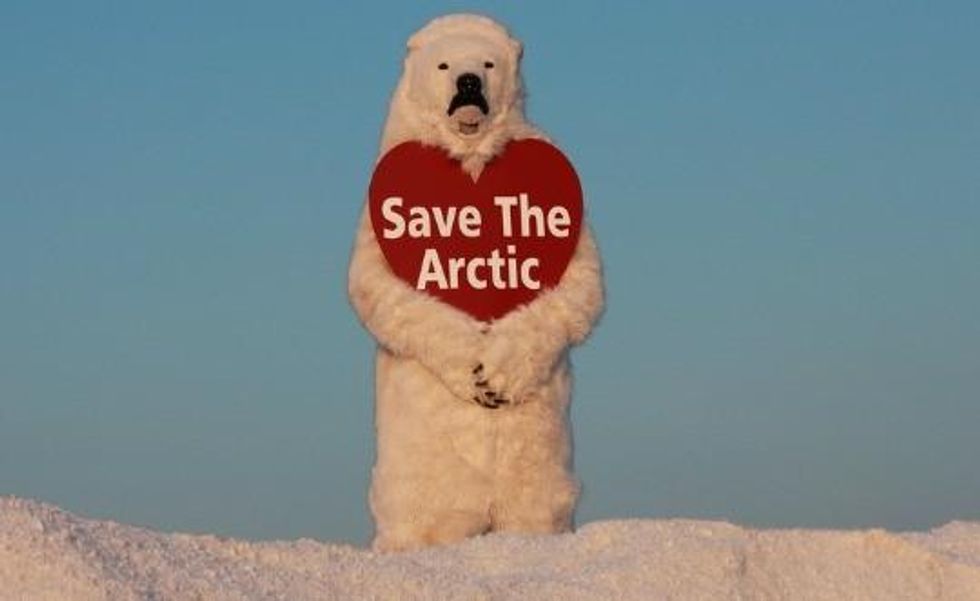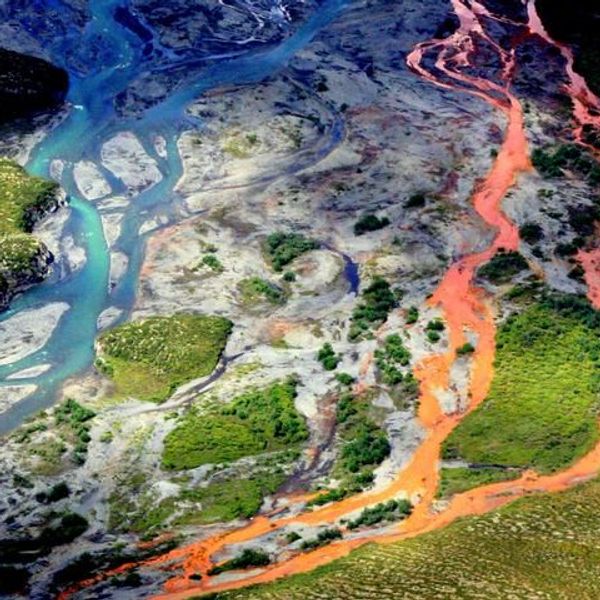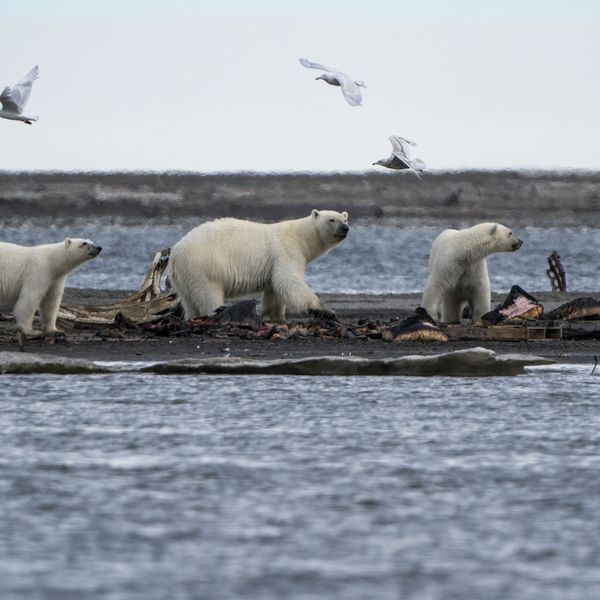EU Votes to Save the Arctic
'What happens in the Arctic matters to us all,' says Greenpeace, calling for complete ban on all drilling in the region

In what the Arctic-campaigning group Greenpeace is calling a victory, European MEPs called for the establishment of a sanctuary in the high seas region around the North Pole, among other measures.
The resolution will bring the agenda to EU foreign ministers and EU Foreign Policy Chief Catherine Ashton, "who have so far been reluctant to speak out against the rapid industrialization of the region by international oil companies including Shell, BP and Russia's state owned energy giant Gazprom," Greenpeace writes.
Clause 38 of Wednesday's resolution states that the European Parliament:
Supports the initiative by five Arctic coastal states to agree on interim precautionary measures to prevent any future fisheries in the Arctic high seas without the prior establishment of appropriate regulatory mechanisms, and supports the development of a network of Arctic conservation areas and, in particular, the protection of the international sea area around the North Pole outside the economic zones of the coastal states.
This "2.8 million square kilometer zone of the global commons" would be the "biggest conservation zone in existence, protecting fish stocks, ice-dependent species, and a huge variety of cold water species," writes Neil Hamilton, Senior Political Adviser at Greenpeace Norway.
"What happens in the Arctic matters to us all, " said Greenpeace activist and member of the Arctic 30 Sini Saarela. Members of the "Arctic 30" were arrested and detained in Russia last year after staging a protest against a Russian drilling rig in Arctic waters. "I'm delighted by this news because it will spark a new conversation that we need to have together. By calling for a sanctuary around the North Pole, MEPs have responded to the millions of people who want to protect the Arctic for future generations."
"This is a direct challenge to the small group of countries who are rushing to open up the fragile Arctic for oil drilling and industrial fishing," Saarela continued. "The status quo is starting to crack, and this now demands a real response from those who see the melting Arctic simply as a new source of profit."
However, "there is one dark cloud," Hamilton writes. As far as actual drilling in the Arctic as a whole, the document only asks for a "precautionary approach"--not a ban on drilling altogether.
"If you're serious about protecting this fragile, vulnerable ecosystem then it's madness to allow oil platforms and giant drilling ships anywhere near it," Hamilton notes.
Additionally, the Parliament added that the Arctic Council--which includes Canada, Denmark, Finland, Iceland, Norway, Russia, Sweden and the United States--needs to form a binding agreement on pollution prevention in the region. However, as Greenpeace states in a press release, the Arctic Council is "an international forum criticized by environmentalists for its closeness to the oil industry."
According to Greenpeace, previous agreements on oil spills "have lacked teeth."
______________________
An Urgent Message From Our Co-Founder
Dear Common Dreams reader, The U.S. is on a fast track to authoritarianism like nothing I've ever seen. Meanwhile, corporate news outlets are utterly capitulating to Trump, twisting their coverage to avoid drawing his ire while lining up to stuff cash in his pockets. That's why I believe that Common Dreams is doing the best and most consequential reporting that we've ever done. Our small but mighty team is a progressive reporting powerhouse, covering the news every day that the corporate media never will. Our mission has always been simple: To inform. To inspire. And to ignite change for the common good. Now here's the key piece that I want all our readers to understand: None of this would be possible without your financial support. That's not just some fundraising cliche. It's the absolute and literal truth. We don't accept corporate advertising and never will. We don't have a paywall because we don't think people should be blocked from critical news based on their ability to pay. Everything we do is funded by the donations of readers like you. Will you donate now to help power the nonprofit, independent reporting of Common Dreams? Thank you for being a vital member of our community. Together, we can keep independent journalism alive when it’s needed most. - Craig Brown, Co-founder |
Jacob Chamberlain is a former staff writer for Common Dreams. He is the author of Migrant Justice in the Age of Removal. His website is www.jacobpchamberlain.com.

In what the Arctic-campaigning group Greenpeace is calling a victory, European MEPs called for the establishment of a sanctuary in the high seas region around the North Pole, among other measures.
The resolution will bring the agenda to EU foreign ministers and EU Foreign Policy Chief Catherine Ashton, "who have so far been reluctant to speak out against the rapid industrialization of the region by international oil companies including Shell, BP and Russia's state owned energy giant Gazprom," Greenpeace writes.
Clause 38 of Wednesday's resolution states that the European Parliament:
Supports the initiative by five Arctic coastal states to agree on interim precautionary measures to prevent any future fisheries in the Arctic high seas without the prior establishment of appropriate regulatory mechanisms, and supports the development of a network of Arctic conservation areas and, in particular, the protection of the international sea area around the North Pole outside the economic zones of the coastal states.
This "2.8 million square kilometer zone of the global commons" would be the "biggest conservation zone in existence, protecting fish stocks, ice-dependent species, and a huge variety of cold water species," writes Neil Hamilton, Senior Political Adviser at Greenpeace Norway.
"What happens in the Arctic matters to us all, " said Greenpeace activist and member of the Arctic 30 Sini Saarela. Members of the "Arctic 30" were arrested and detained in Russia last year after staging a protest against a Russian drilling rig in Arctic waters. "I'm delighted by this news because it will spark a new conversation that we need to have together. By calling for a sanctuary around the North Pole, MEPs have responded to the millions of people who want to protect the Arctic for future generations."
"This is a direct challenge to the small group of countries who are rushing to open up the fragile Arctic for oil drilling and industrial fishing," Saarela continued. "The status quo is starting to crack, and this now demands a real response from those who see the melting Arctic simply as a new source of profit."
However, "there is one dark cloud," Hamilton writes. As far as actual drilling in the Arctic as a whole, the document only asks for a "precautionary approach"--not a ban on drilling altogether.
"If you're serious about protecting this fragile, vulnerable ecosystem then it's madness to allow oil platforms and giant drilling ships anywhere near it," Hamilton notes.
Additionally, the Parliament added that the Arctic Council--which includes Canada, Denmark, Finland, Iceland, Norway, Russia, Sweden and the United States--needs to form a binding agreement on pollution prevention in the region. However, as Greenpeace states in a press release, the Arctic Council is "an international forum criticized by environmentalists for its closeness to the oil industry."
According to Greenpeace, previous agreements on oil spills "have lacked teeth."
______________________
Jacob Chamberlain is a former staff writer for Common Dreams. He is the author of Migrant Justice in the Age of Removal. His website is www.jacobpchamberlain.com.

In what the Arctic-campaigning group Greenpeace is calling a victory, European MEPs called for the establishment of a sanctuary in the high seas region around the North Pole, among other measures.
The resolution will bring the agenda to EU foreign ministers and EU Foreign Policy Chief Catherine Ashton, "who have so far been reluctant to speak out against the rapid industrialization of the region by international oil companies including Shell, BP and Russia's state owned energy giant Gazprom," Greenpeace writes.
Clause 38 of Wednesday's resolution states that the European Parliament:
Supports the initiative by five Arctic coastal states to agree on interim precautionary measures to prevent any future fisheries in the Arctic high seas without the prior establishment of appropriate regulatory mechanisms, and supports the development of a network of Arctic conservation areas and, in particular, the protection of the international sea area around the North Pole outside the economic zones of the coastal states.
This "2.8 million square kilometer zone of the global commons" would be the "biggest conservation zone in existence, protecting fish stocks, ice-dependent species, and a huge variety of cold water species," writes Neil Hamilton, Senior Political Adviser at Greenpeace Norway.
"What happens in the Arctic matters to us all, " said Greenpeace activist and member of the Arctic 30 Sini Saarela. Members of the "Arctic 30" were arrested and detained in Russia last year after staging a protest against a Russian drilling rig in Arctic waters. "I'm delighted by this news because it will spark a new conversation that we need to have together. By calling for a sanctuary around the North Pole, MEPs have responded to the millions of people who want to protect the Arctic for future generations."
"This is a direct challenge to the small group of countries who are rushing to open up the fragile Arctic for oil drilling and industrial fishing," Saarela continued. "The status quo is starting to crack, and this now demands a real response from those who see the melting Arctic simply as a new source of profit."
However, "there is one dark cloud," Hamilton writes. As far as actual drilling in the Arctic as a whole, the document only asks for a "precautionary approach"--not a ban on drilling altogether.
"If you're serious about protecting this fragile, vulnerable ecosystem then it's madness to allow oil platforms and giant drilling ships anywhere near it," Hamilton notes.
Additionally, the Parliament added that the Arctic Council--which includes Canada, Denmark, Finland, Iceland, Norway, Russia, Sweden and the United States--needs to form a binding agreement on pollution prevention in the region. However, as Greenpeace states in a press release, the Arctic Council is "an international forum criticized by environmentalists for its closeness to the oil industry."
According to Greenpeace, previous agreements on oil spills "have lacked teeth."
______________________

